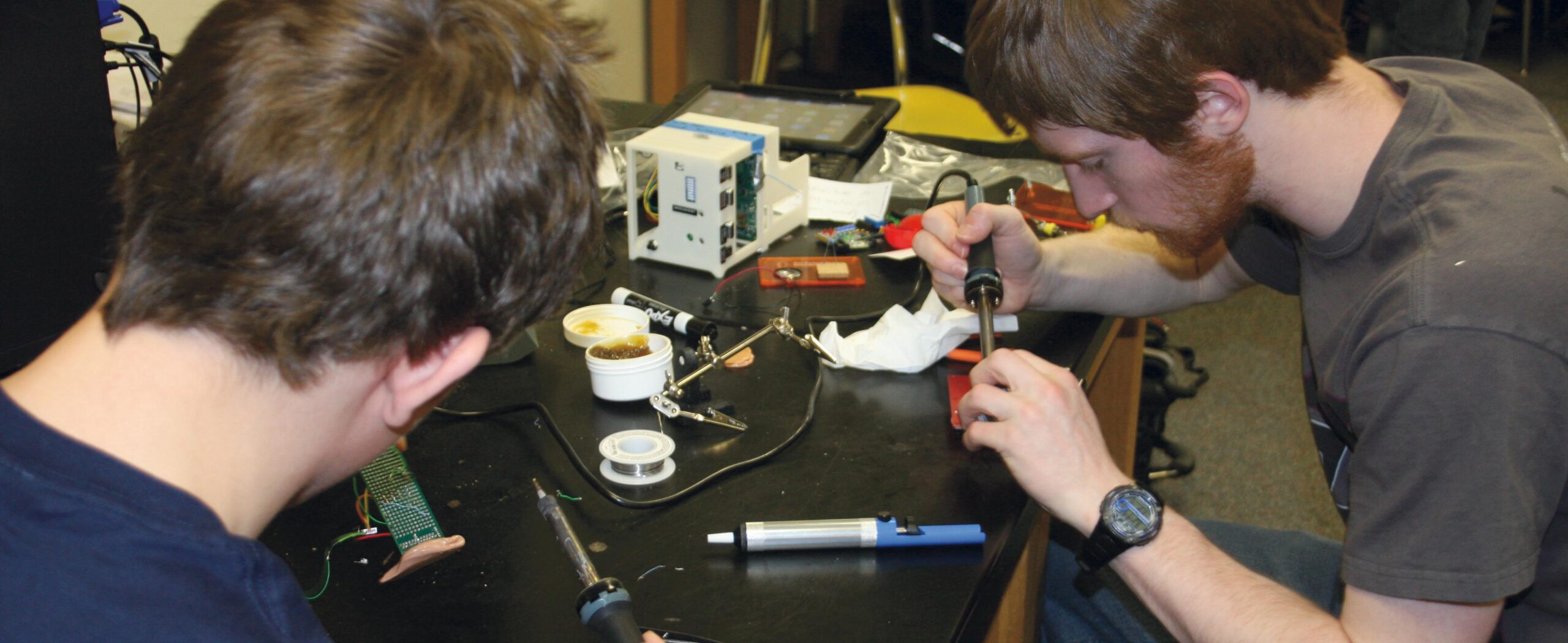Minnehaha’s International Space Station (ISS) team creates their experiment during class time
On Feb. 25, NASA astronaut Dr. Tom Marshburn gave a presentation during Tuesday assembly period describing his three months and twenty-six days on the International Space Station (ISS). But for members of the Applied Research in Engineering (A.R.E.) class led by Sam Terfa and Nancy Cripe, Marshburn’s presentation represented the culmination of a year’s work.
The basis of the A.R.E. class as stated in the Minnehaha Signal is “the design, building, testing and launch of an experiment to the International Space Station in the spring,” objectives which returning ISS project members Poppy Anema, Viola Holman, Hugh Mayo, Max Thompson and Erik Dahlman, and new members Blake Brumley, Kevin Cox, Andrew Johnson, Alex Ramos, Eric Smith, Griffin Snow, Ethan Wagner and Tom Weber have undertaken this year. “We’re testing the effect of microgravity environment on fluid flow,” said Terfa, “[by] using a pump, pushing water through a flow sensor.”
Terfa explained that “in terms of physics, capillary action is fluid moving along a surface,” so the project will test the hypothesis that “in microgravity, the fluid tends to ride along a surface really well, [and] ride along a surface really fast.” “The students researched other projects that had gone to space for the last 20 years, until they found some things that perked their interest,” said Cripe, adding that “the students came up with all the ideas and narrowed it down, and chose the experiment. I can definitely say I had very little influence, because we are not doing a life science experiment!” Student independence is one of the most defining characteristics of the ISS project this year.
Last year, the ISS project was an extracurricular activity, but this year, it was reconfigured as a science class. “The big difference [between this year and last year],” said Terfa, “is the amount of contact time with students. We’ve gotten to investigate our experiment a lot more. We went down some dead ends, but we took the time to do it properly which was great.” Senior Ethan Wagner said, “[the ISS class] is like a real life work scenario[,] where you have to work together in a group or else your project will fail. The students are the teachers.”
“We like to think of it,” said Cripe, “if you [are] on the ISS team, that you are working in an engineering lab [like] a tech start-up,” a notion that permeates the class’ pedagogy, decision-making hierarchy, and grading structure. In order to emulate a real engineering lab, students learn valuable skills in ways very different from a traditional science class.
“We’ve acquired research, engineering, and project management skills,” said senior Max Thompson. “The class is unique in that it’s applying the theoretical concepts we’ve learned in math and sciences courses to a practical, real life project.”
Such skills include basic circuitry and computer programming, which students taught themselves over the summer by tinkering with Stamp micro controller kits provided by the school. In class, students learned skills like soldering, project design, and electrical troubleshooting with the help of four community mentors.
“[Community mentors],” Cripe said, “are men and women who work as professional engineers, software designers, computer programmers [and] project managers and they volunteer their time, they come in and work with the students, kind of tuck them under their wing and teach them.” The class is very trial-and-error based, as a real internship would be. “Somebody’s going to show you how to do it, and then you’re going to sit down and do it, and it’s not going to work very well, and you’re going to have to suck some of the solder out and you’re going to have to try it again.”
The flow of the class is very organic, as students refined their skills and the project design throughout. “We get together and decide what would be a good, original experiment to send to space,” said senior Tom Weber. “Then we find out how we can build it through research, design and testing. Then we put it together and tweak it to make sure it will work. The final project is very different from the original proposal.”
Consonant with the class’ organic flow, A.R.E.’s grading structure is 70% “project-based, and 30% of it is smaller homework assignments, research, participation,” said Cripe. The project-based portion includes deadlines and “performance reviews[,]” in which Terfa said, “students [are] interviewed by mentors and [students] talk about their [performance,] do a self-assessment, and then we talk about what we’re seeing, and there’s a big long form we have them fill out and we talk through.”
These reviews emulate the reviews that engineers would undergo at a real tech firm, as do extra credit points. “If you were working for maybe 3M or Medtronic, and if you finished early on a project, you’d get a $10,000 bonus,” said Cripe. “Well, we don’t have that much money, so we give that bonus with a grade.”
The deadlines paid off, as the project was successfully sent to Valley Christian High School in California during the week of Marshburn’s presentation. It will launch into space on May 1, and will orbit the Earth for thirty days before reentry, completing the full circle of research, development and scientific advancement.

